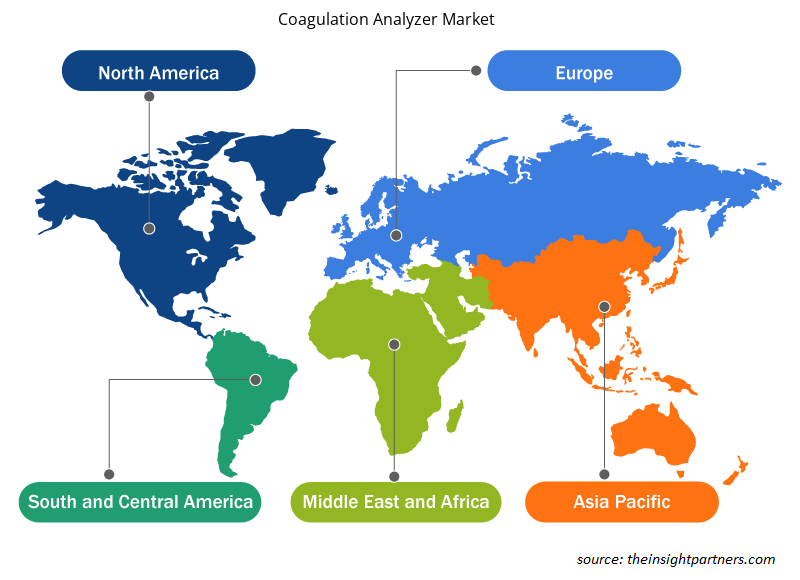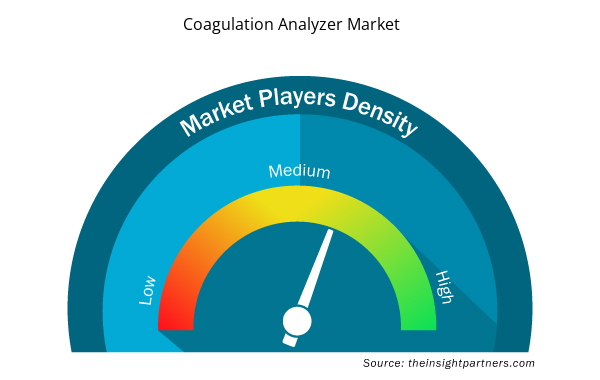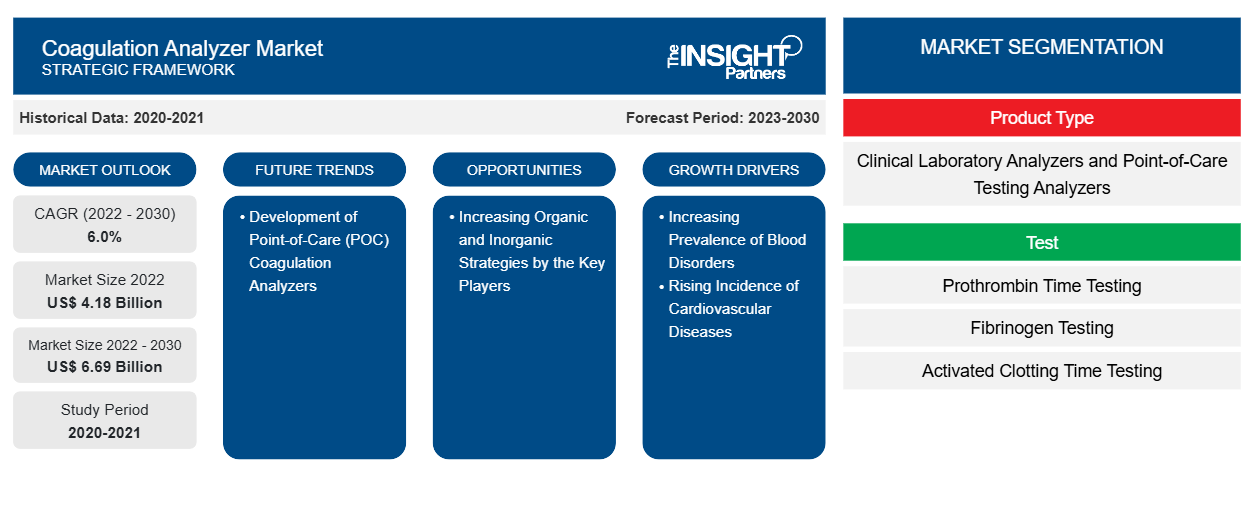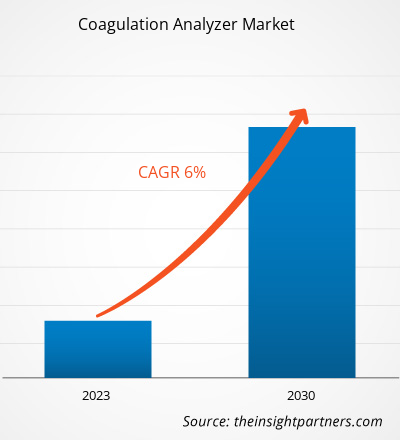[調査レポート] 凝固分析装置市場規模は、2022年の41億8,371万米ドルから2030年には66億9,008万米ドルに成長すると予想されており、2022年から2030年にかけて6.0%のCAGRを記録すると予測されています。
アナリストの視点
凝固分析装置市場分析には、人口の間での血液疾患の有病率の上昇や心血管疾患の発生率の増加などの推進要因が含まれます。さらに、ポイントオブケア検査凝固分析装置は、2022年から2030年にかけて市場が成長する将来のトレンドとして機能します。レポートでプロファイルされたセグメンテーションによると、製品タイプセグメントに基づいて、臨床検査室分析装置セグメントが2020年に最大のシェアを占めました。テストタイプに関しては、2Dプロトロンビン時間テストセグメントが最大シェアを占めて市場を支配しました。技術別では、光学技術セグメントが凝固分析装置のかなりのシェアを占め、予測期間中に市場の成長を支配するでしょう。アプリケーションに基づいて、臨床検査室セグメントは、2022年から2030年にかけて凝固分析装置市場の成長で最大のシェアを占めると予想されます。
凝固分析装置は、血小板レベルを迅速かつ簡単なプロセスで測定します。凝固分析装置は、数分という短時間でトロンボリンとトロンボプラスチンのレベルをチェックし、凝固経路の速度を測定するために使用されます。また、いくつかのトップ企業が、血液凝固検査用の革新的な凝固分析装置を製造しています。Sysmex CS-2500 システムはその一例であり、PSI 技術を使用したアッセイベースの分析前サンプル品質チェック、自動混合研究、自動血小板凝集、および血栓波形分析を含む、スマートに設計された技術を採用しています。このような自動化プロセスにより、効率、優れた精度、および信頼性の高い初回実行結果が向上します。
要件に合わせてレポートをカスタマイズする
このレポートの一部、国レベルの分析、Excelデータパックなど、あらゆるレポートを無料でカスタマイズできます。また、スタートアップや大学向けのお得なオファーや割引もご利用いただけます。
- このレポートの主要な市場動向を入手してください。この無料サンプルには、市場動向から見積もりや予測に至るまでのデータ分析が含まれます。
市場分析
血液疾患の罹患率の上昇
凝固分析装置は、血栓形成または血栓凝固の速度を測定および評価する装置です。血小板レベル、トロンボリンおよびトロンボプラスチンレベルを正確に測定するための迅速かつ簡単な方法を提供します。全米希少疾患協会によると、血友病Aは一般的なX連鎖劣性疾患であり、フォン・ヴィレブランド病に次いで2番目に多い遺伝性凝固因子欠乏症です。米国では、新生児男性の約5,000人に1人が血友病Aを患っています。国立医学図書館(NLM)によると、2020年には米国で約30,000〜33,000人の男性が血友病に罹患していました。米国保健福祉省によると、2020年には約10万人のアメリカ人が最も一般的な遺伝性血液疾患である鎌状赤血球症(SCD)を患っていました。さらに、2050年までに、SCDを患う人の数は約30%増加すると予想されています。国立医学図書館によると、2022年には、すべての個人(無作為抽出された人口)の約1%、つまり100万人あたり125人がフォンヴィレブランド病を患っています。同様に、欧州連合では、2020年にNLMで発表された研究によると、8000万人が癌から出血性疾患に至るまでの血液疾患に苦しんでいます。国立希少疾患組織によると、2022年には、米国では自己免疫性出血性疾患である免疫血小板減少症(ITP)が毎年100万人あたり約66人の成人に影響を与えています。さらに、米国では、成人のITPの発生率は10万人あたり年間約3.3人ですが、有病率は10万人あたり9.5人です。このように、血液疾患の有病率の増加が凝固分析装置市場の成長を牽引しています。
ポイントオブケア(POC)凝固分析装置の開発
外傷やその他の出血の問題を抱える患者にとって、迅速で信頼性の高い止血評価は不可欠です。サンプルの準備と分析プロセスの要件により、通常の凝固アッセイでは血栓形成のプロセスを視覚化できず、結果は 30 ~ 90 分後にのみ得られます。粘弾性凝固検査、血小板機能検査、血液ガス分析、その他の凝固計などのポイントオブケア (POC) デバイスは、止血の評価に使用できます。POC 測定ツールは、意思決定および管理ツールとして、病院の内外の両方で使用できます。時間が最優先の場合、POC 分析装置は、緊急治療室、冠状動脈ケアユニット、手術室、処置室で即時の実用的な結果を提供します。外来診療所や医師のオフィスに加えて、これらのデバイスは薬局、ケアセンター、患者の自宅での患者管理に役立ちます。POC 凝固分析装置は、中央研究所が提供する診断品質管理を損なうことなく、タイムリーな結果を提供します。 POC テストでは、正確性と品質保証とともに、迅速な結果を提供することが重要です。
2021年、シーメンス ヘルスシナーズは、中容量から大容量のハンドヘルドPOC凝固検査装置である完全自動化されたCN-3000およびCN-6000システムを発売しました。シーメンス ヘルスシナーズのXprecia Stride凝固分析装置は、POC凝固分析装置としてFDAの認可を受けています。この装置は、PT/INR(プロトロンビン時間/国際標準化比)検査の性能がロシュ コアグチェックXSと同等であることが実証されています。
したがって、POC凝固分析装置の開発が進むことで、予測期間中に市場の成長が促進される可能性があります。
レポートのセグメントと範囲
製品タイプに基づく洞察
製品タイプに基づいて、凝固分析装置市場は、臨床検査分析装置とポイントオブケア検査 分析装置に分類されます。臨床検査分析装置は、さらにシステムと消耗品に分かれています。臨床検査分析装置セグメントは、2022年に大きな市場シェアを占めました。ポイントオブケア検査分析装置は、凝固分析装置市場で大きなCAGRを占めました。ポイントオブケア(POC)検査分析装置は、血液タンパク質の結果を取得するために使用されます。これらの分析装置は、診療所や病院で使用されます。POCT検査分析装置は、いくつかの医療検査に関する迅速なフィードバックを提供します。
POCTの利点
- ポータビリティ
- 利便性
- スピード
- 接続性
- サンプル品質
- 品質保証
これらのデバイスは、凝固血液の電気化学的、光学的、および機械的パラメータを測定します。さまざまな活性剤の助けを借りた凝固モニタリングの POC テストは、出血障害の検出と抗凝固薬のモニタリングにおいて重要な役割を果たします。この点で、マイクロ流体、蛍光顕微鏡、電気化学センシング、光音響検出、マイクロ/ナノ電気機械システムなどの高度な技術が採用され、高精度で堅牢かつコスト効率の高い POC デバイス (例: Roche Diagnostics CoaguChek XS System、ARKRAY, Inc. SPOTCHEM HS HS-7710) が開発されています。
テストタイプベースの洞察
検査の種類に基づいて、世界の凝固分析装置市場は、プロトロンビン時間検査、フィブリノーゲン検査、Dダイマー検査、血小板機能検査、活性化凝固時間検査、活性化部分トロンボプラスチン時間検査などに分類されます。プロトロンビン時間検査セグメントは、2022年に最大の市場シェアを占めました。Dダイマー検査セグメントは、予測期間中に最高のCAGRで成長すると予想されています。プロトロンビン時間(PT)は、出血性疾患または過度の凝固障害の検出と診断に役立つ検査です。国際標準化比はPT結果から計算され、血栓を予防する抗凝血薬ワルファリン(クマジン)の働きを監視するために使用されます。
PT は、物質 (試薬) を加えた後、血液サンプル内で血栓が形成されるまでの秒数を測定します。PT は、多くの場合、部分トロンボプラスチン時間 (PTT) とともに実施され、適切な血栓形成に重要な役割を果たす凝固因子と呼ばれるタンパク質の量と機能を一緒に評価します。
抗凝固薬ワルファリンの服用を処方された場合 、薬が期待通りの効果を発揮しているかどうかを確認するために、PT と INR が定期的に検査されます。
同様に、D-ダイマー検査は、不適切な血栓(血栓)の存在を除外するために使われます。D-ダイマー検査が除外に使われる症状には、深部静脈血栓症、脳卒中、肺塞栓症などがあります。この検査は、過凝固(不適切な凝固傾向)を引き起こす疾患や症状の診断に使用できます。D-ダイマー値は、播種性血管内凝固症候群(DIC)の診断や、DIC治療の有効性の監視にも使用できます。
D-ダイマーは、体内で血栓が溶解したときに生成されるタンパク質断片の 1 つです。通常、体内で血栓が形成されて分解されない限り、D-ダイマーは検出されないか、非常に低いレベルでしか検出されません。その後、血栓が形成されて分解されると、血中の D-ダイマーのレベルが大幅に上昇する可能性があります。この検査では、血中の D-ダイマーを検出します。
テクノロジーに基づく洞察
技術面では、凝固分析装置市場は、光学技術、機械技術、電気化学技術、その他に分類されています。光学技術セグメントは、2022年に最大の凝固分析装置市場シェアを占めました。光学凝固分析装置は、検査試薬と一緒に使用され、心臓病学、外科、集中治療における臨床決定をサポートする迅速なラボ品質の結果を提供します。Wondfoのポイントオブケア検査(POCT)凝固分析装置は、PT / INR / APTT、TT、FIB、およびACTを検査できる最初の機器です。同様に、血液の粘弾性特性は、光散乱または光透過によってその光学特性を調べることによって監視できます。レーザースペックルレオメーターでは、血液中のブラウン運動による光散乱により、血液の粘弾性特性または凝固に関する直接的な情報が得られます。これを測定するには、凝固中の血液にレーザーを照射しながら、一連の画像フレームから自己相関曲線を見つけることによって、時間とともに変化するスペックルの強度の変動を測定します。LSR 法では、抗凝固状態をリアルタイムで迅速に評価することもできます。
アプリケーションベースの洞察
アプリケーション別に見ると、市場は臨床検査室、病院、その他に分類されています。臨床検査室セグメントは2022年に最高の市場シェアを占め、予測期間中に最高のCAGRを記録するでしょう。臨床検査室は、医師が患者の診断、治療、管理を行うのに役立つ幅広い検査手順を提供する医療施設です。臨床検査室は、分子診断製品およびサービスの主な用途です。規制要件に従って、十分に確立された施設を備えています。検査室では、さまざまなパラメータで可能な限りすべての血液分析を使用します。患者から収集されたサンプルは、さまざまな機器、試薬、方法、およびテクノロジーを使用して分析および研究されます。検査室は、病院、診療所などにサービスを提供しています。慢性疾患、感染症、生活習慣病の有病率の増加は、市場の成長を促進する主要な要因の1つです。
地域分析
凝固分析装置市場では北米が最大のシェアを占めています。北米では、米国が凝固分析装置の最大の市場です。この市場の成長は、主に血液疾患の発生率の増加、心房細動(AFib)などの心血管疾患の有病率の増加、市場プレーヤーの開発、および米国における主要な市場プレーヤーの存在によって推進されています。米国疾病管理予防センター(CDC)によると、2019年に米国で約183,321件の死亡証明書にAFibが記載されており、そのうち約26,535件の死亡の主な原因でした。米国では2030年までに1,210万人がAFibに苦しむと予想されています。カナダ予防医療タスクフォースによると、カナダでの心房細動(AFib)の発生率は年間4.5%増加しており、40歳以上の人の生涯リスクは約25%です。血液疾患の発生率増加は、凝固分析装置の需要を促進するものと考えられます。たとえば、CDC によると、血友病 A は出生男児 5,000 人に 1 人が罹患しています。毎年、約 400 人の赤ちゃんが血友病 A で生まれています。また、2012 年から 2018 年の間に米国で約 33,000 人の男性が血友病と診断されたことも報告されています。さらに、約 300,000 人のカナダ人が遺伝性出血性疾患の遺伝子を持っています。これらの人々の 10 人に 1 人、少なくとも 30,000 人のカナダ人が、医療を必要とするほど重篤な症状を抱えています。その多くは適切に診断されていません。遺伝性出血性疾患の包括的ケア クリニックのカナダ ネットワークに登録されている遺伝性出血性疾患患者はわずか 10,000 人です。
凝固分析装置市場の地域別分析
予測期間を通じて凝固分析装置市場に影響を与える地域的な傾向と要因は、Insight Partners のアナリストによって徹底的に説明されています。このセクションでは、北米、ヨーロッパ、アジア太平洋、中東、アフリカ、南米、中米にわたる凝固分析装置市場のセグメントと地理についても説明します。

- 凝固分析装置市場の地域別データを入手
凝固分析装置市場レポートの範囲
| レポート属性 | 詳細 |
|---|---|
| 2022年の市場規模 | 41億8千万米ドル |
| 2030年までの市場規模 | 66億9000万米ドル |
| 世界のCAGR(2022年 - 2030年) | 6.0% |
| 履歴データ | 2020-2021 |
| 予測期間 | 2023-2030 |
| 対象セグメント | 製品タイプ別
|
| 対象地域と国 | 北米
|
| 市場リーダーと主要企業プロフィール |
|
凝固分析装置市場のプレーヤー密度:ビジネスダイナミクスへの影響を理解する
凝固分析装置市場は、消費者の嗜好の変化、技術の進歩、製品の利点に対する認識の高まりなどの要因により、エンドユーザーの需要が高まり、急速に成長しています。需要が高まるにつれて、企業は提供を拡大し、消費者のニーズを満たすために革新し、新たなトレンドを活用し、市場の成長をさらに促進しています。
市場プレーヤー密度とは、特定の市場または業界内で活動している企業または会社の分布を指します。これは、特定の市場スペースに、その市場規模または総市場価値に対してどれだけの競合相手 (市場プレーヤー) が存在するかを示します。
凝固分析装置市場で事業を展開している主要企業は次のとおりです。
- アボットラボラトリーズ
- ダナハー社
- シーメンスヘルスケア株式会社
- サーモフィッシャーサイエンティフィック
- シスメックス株式会社
免責事項:上記の企業は、特定の順序でランク付けされていません。

- 凝固分析装置市場のトップキープレーヤーの概要を入手
血液疾患に対する意識向上プログラムが拡大すれば、凝固分析装置の市場成長が促進される可能性が高い。血友病健康教育および予防資金提供プロジェクトは、CDC の血液疾患部門で最大のプログラムである。CDC は、健康を促進し、出血性疾患に関連する合併症を予防することを目的としたプロジェクトに資金を提供してきた。
したがって、この地域における血液疾患の増加、心血管疾患の罹患率の上昇、および血液疾患の予防に対する政府の支援により、予測期間中に北米の凝固分析装置市場の成長が促進されると予想されます。
このレポートでは、世界の凝固分析装置市場で活動する主要企業を紹介しています。これには、アボット ラボラトリーズ、ダナハー社、シーメンス ヘルスケア社、サーモフィッシャーサイエンティフィック社、シスメックス社、堀場製作所、日本光電工業社、F. ホフマン・ラ・ロシュ社、マキュラ バイオテクノロジー社、バイオ グループ メディカル システム社が含まれます。
2021年2月、Siemens HealthineersとSysmex Corporationは、両社が長年にわたり締結してきた、幅広い止血製品ポートフォリオに関する世界的な供給、販売代理店、販売およびサービス契約を複数年延長して更新すると発表しました。契約の一環として、Siemens Healthineersは新しいSysmex CN Systemsを販売します。
シスメックスは2020年7月、EMEA地域において新製品「全自動血液凝固分析装置CN-6000、CN-3000」の発売を発表しました。
企業プロフィール
- アボットラボラトリーズ
- ダナハー社
- シーメンスヘルスケア株式会社
- サーモフィッシャーサイエンティフィック
- シスメックス株式会社
- 堀場製作所
- 日本光電株式会社
- F.ホフマン・ラ・ロシュ株式会社
- マキュラバイオテクノロジー株式会社
- バイオグループメディカルシステムSRL
- 過去2年間の分析、基準年、CAGRによる予測(7年間)
- PEST分析とSWOT分析
- 市場規模価値/数量 - 世界、地域、国
- 業界と競争環境
- Excel データセット


- Helicopters Market
- Micro-Surgical Robot Market
- Pressure Vessel Composite Materials Market
- Neurovascular Devices Market
- Nuclear Waste Management System Market
- Small Internal Combustion Engine Market
- Environmental Consulting Service Market
- Sterilization Services Market
- Quantitative Structure-Activity Relationship (QSAR) Market
- Authentication and Brand Protection Market

Report Coverage
Revenue forecast, Company Analysis, Industry landscape, Growth factors, and Trends

Segment Covered
This text is related
to segments covered.

Regional Scope
North America, Europe, Asia Pacific, Middle East & Africa, South & Central America

Country Scope
This text is related
to country scope.
よくある質問
Based on product type, the clinical laboratory analyzers segment took the forefront lead in the global market by accounting largest share in 2020 and is expected to continue to do so till the forecast period.
Coagulation analyzers measure blood platelet levels in a fast and simple process. The coagulation analyzer is used for measuring a coagulation pathway speed and thrombolin and thromboplastin levels in low as in a few minutes. Also, several top companies are manufacturing innovative coagulation analyzers for hemostasis testing. The Sysmex CS-2500 system is one such example that employs smartly designed technologies involving assay-based preanalytical sample-quality checks using PSI technology, automated mixing studies, automated platelet aggregation, and clot waveform analysis. Such automated processes improve efficiency, exceptional accuracy, and reliable first-run results.
Abbott Laboratories, Danaher Corp, Siemens Healthcare GmbH, Thermo Fisher Scientific Inc, Sysmex Corporation, Horiba Ltd., Nihon Kohden Corp, F. Hoffmann-La Roche Ltd, Maccura Biotechnology Co Ltd, and Bio Group Medical System SRL, among others are among the leading companies operating in the global coagulation analyzers market.
The prothrombin time testing segment dominated the global coagulation analyzers market and accounted for the largest revenue in 2022.
Rising prevalence of blood disorders is a standalone factor responsible for driving the overall coagulation analyzers market growth during the forecast period.
Trends and growth analysis reports related to Life Sciences : READ MORE..
The List of Report Companies - Coagulation Analyzers Market
- Abbott Laboratories
- Danaher Corp
- Siemens Healthcare GmbH
- Thermo Fisher Scientific Inc
- Sysmex Corporation
- Horiba Ltd.
- Nihon Kohden Corp
- F. Hoffmann-La Roche Ltd
- Maccura Biotechnology Co Ltd
- Bio Group Medical System SRL
The Insight Partners performs research in 4 major stages: Data Collection & Secondary Research, Primary Research, Data Analysis and Data Triangulation & Final Review.
- Data Collection and Secondary Research:
As a market research and consulting firm operating from a decade, we have published and advised several client across the globe. First step for any study will start with an assessment of currently available data and insights from existing reports. Further, historical and current market information is collected from Investor Presentations, Annual Reports, SEC Filings, etc., and other information related to company’s performance and market positioning are gathered from Paid Databases (Factiva, Hoovers, and Reuters) and various other publications available in public domain.
Several associations trade associates, technical forums, institutes, societies and organization are accessed to gain technical as well as market related insights through their publications such as research papers, blogs and press releases related to the studies are referred to get cues about the market. Further, white papers, journals, magazines, and other news articles published in last 3 years are scrutinized and analyzed to understand the current market trends.
- Primary Research:
The primarily interview analysis comprise of data obtained from industry participants interview and answers to survey questions gathered by in-house primary team.
For primary research, interviews are conducted with industry experts/CEOs/Marketing Managers/VPs/Subject Matter Experts from both demand and supply side to get a 360-degree view of the market. The primary team conducts several interviews based on the complexity of the markets to understand the various market trends and dynamics which makes research more credible and precise.
A typical research interview fulfils the following functions:
- Provides first-hand information on the market size, market trends, growth trends, competitive landscape, and outlook
- Validates and strengthens in-house secondary research findings
- Develops the analysis team’s expertise and market understanding
Primary research involves email interactions and telephone interviews for each market, category, segment, and sub-segment across geographies. The participants who typically take part in such a process include, but are not limited to:
- Industry participants: VPs, business development managers, market intelligence managers and national sales managers
- Outside experts: Valuation experts, research analysts and key opinion leaders specializing in the electronics and semiconductor industry.
Below is the breakup of our primary respondents by company, designation, and region:

Once we receive the confirmation from primary research sources or primary respondents, we finalize the base year market estimation and forecast the data as per the macroeconomic and microeconomic factors assessed during data collection.
- Data Analysis:
Once data is validated through both secondary as well as primary respondents, we finalize the market estimations by hypothesis formulation and factor analysis at regional and country level.
- Macro-Economic Factor Analysis:
We analyse macroeconomic indicators such the gross domestic product (GDP), increase in the demand for goods and services across industries, technological advancement, regional economic growth, governmental policies, the influence of COVID-19, PEST analysis, and other aspects. This analysis aids in setting benchmarks for various nations/regions and approximating market splits. Additionally, the general trend of the aforementioned components aid in determining the market's development possibilities.
- Country Level Data:
Various factors that are especially aligned to the country are taken into account to determine the market size for a certain area and country, including the presence of vendors, such as headquarters and offices, the country's GDP, demand patterns, and industry growth. To comprehend the market dynamics for the nation, a number of growth variables, inhibitors, application areas, and current market trends are researched. The aforementioned elements aid in determining the country's overall market's growth potential.
- Company Profile:
The “Table of Contents” is formulated by listing and analyzing more than 25 - 30 companies operating in the market ecosystem across geographies. However, we profile only 10 companies as a standard practice in our syndicate reports. These 10 companies comprise leading, emerging, and regional players. Nonetheless, our analysis is not restricted to the 10 listed companies, we also analyze other companies present in the market to develop a holistic view and understand the prevailing trends. The “Company Profiles” section in the report covers key facts, business description, products & services, financial information, SWOT analysis, and key developments. The financial information presented is extracted from the annual reports and official documents of the publicly listed companies. Upon collecting the information for the sections of respective companies, we verify them via various primary sources and then compile the data in respective company profiles. The company level information helps us in deriving the base number as well as in forecasting the market size.
- Developing Base Number:
Aggregation of sales statistics (2020-2022) and macro-economic factor, and other secondary and primary research insights are utilized to arrive at base number and related market shares for 2022. The data gaps are identified in this step and relevant market data is analyzed, collected from paid primary interviews or databases. On finalizing the base year market size, forecasts are developed on the basis of macro-economic, industry and market growth factors and company level analysis.
- Data Triangulation and Final Review:
The market findings and base year market size calculations are validated from supply as well as demand side. Demand side validations are based on macro-economic factor analysis and benchmarks for respective regions and countries. In case of supply side validations, revenues of major companies are estimated (in case not available) based on industry benchmark, approximate number of employees, product portfolio, and primary interviews revenues are gathered. Further revenue from target product/service segment is assessed to avoid overshooting of market statistics. In case of heavy deviations between supply and demand side values, all thes steps are repeated to achieve synchronization.
We follow an iterative model, wherein we share our research findings with Subject Matter Experts (SME’s) and Key Opinion Leaders (KOLs) until consensus view of the market is not formulated – this model negates any drastic deviation in the opinions of experts. Only validated and universally acceptable research findings are quoted in our reports.
We have important check points that we use to validate our research findings – which we call – data triangulation, where we validate the information, we generate from secondary sources with primary interviews and then we re-validate with our internal data bases and Subject matter experts. This comprehensive model enables us to deliver high quality, reliable data in shortest possible time.


 このレポートの無料サンプルを入手する
このレポートの無料サンプルを入手する